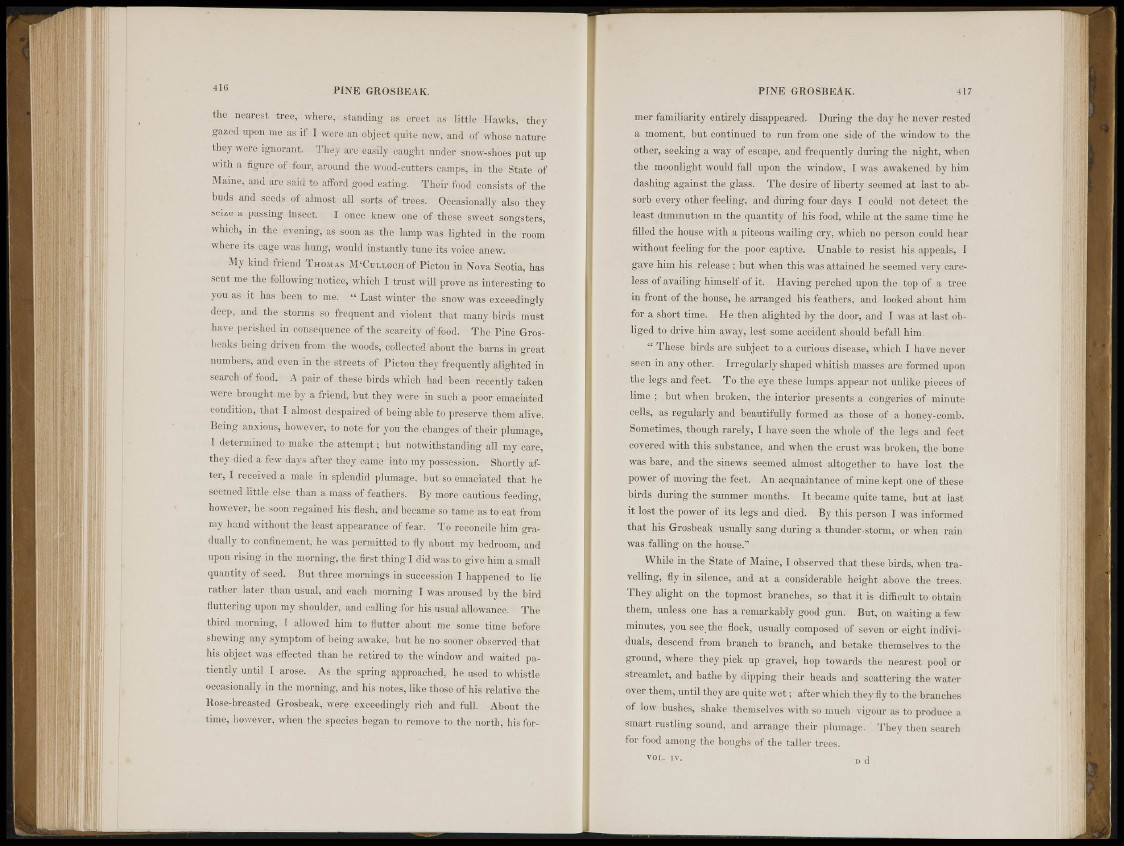
416 P I N E GROSBEAK.
i l i nearest tree* where, standing- as erect as little Hawks, they
gazed upon me a® if I were an object quite new, and of whose nature
they were ignorant. They are easily caughfeunder snow-shoes put np
with a figure of.four, around the wood-c ut tors ramps, in the Static of
Maine, and are said to affttd good eating. Their food consists of the
buds and Spi é ©f almost all sorts of trocs/ Occasionally also they
s e i z e a passing- insect. I once knew one of these sweet - songsters,
which, in the evening, as soon as-rfHfolknip was lighted in the'room
" h p r c its- cage, was hung, would instantly tune its voice anew.
My kind friend Thomas M'Ci:i.t.oeii of Fictou in Nora Seotia, has
sent me the following-notice; which I trust will prove 'as interesting to
you as it has been. 1.0 me. Last winter the snow was exceedingly
deep, and the storms so freqttent and violent that many birds nSisï
have perished i » conséquence of the scarcity of food. The Pine Grosbeaks
being driver, from the woods, collected about the barns in great
numb, rs, and even in the- streets of I'iotou ttey frequently alighted in
search offood. A pair of those birds which had • been: rîîcchtly takeii
were brought me by a Mead, but they were in such a. poor emaciated
condition, that I almost despaired of being able pi.preserve tlmm alive.
Being anxious, however, to note for you tl.o changes of their plumage,
I determined to make the attempt ; but notwithstanding all my care,
they died a tW days after they came into my possession. Shortly af-
:ter, I received a male i.11 splendid plumage, but so emaciated that he
SM'.mcd -little else than a mass of feathers. By imirV Vatifious fee'dnig,'
however; he soon regained his flesh, and became .so tamo as to cat from
mJ' band without this least appearance of fear. To reconcile him gradually
to confinement, he was permitted to fly about my bedroom, and
upon rising in the morning; the first thing I did was to give him a small
quantity of seed. But three mornings in succession. 1 happened' to lié
rather later than usual, and ¡each morning I was aroused by the bird
fluttering upon my should«, and calling for his Usual allowance. The
third morning, -1 allowed him-to flutter about mo some time before
shewing: any symptom of being awake, imt he -no sooner cibst'iwod that
his object was effected than he retired to the window and waited pa.
tiently until I «ose. As the ,spring approached, he used to whistle
occasionally in the morning,, and his notes, like those of his relative thé
Rose breasted Grosbeak, wer.es exceedingly rich and full. About the
-time, however, when the spccies began to remove to the north, his for-
P I N E GROSBEAK. 417
mer familiarity entirely disappeared. During the day he never rested
a moment, but continued to run from one side of the window to the
other, seeking- a way of escape, and frequently during the night, when
the moonlight would fall upon the window. I was awakened by him
dashing against tin- glass. The desire of liberty seemed,at last to absorb:
every other feeling, and (luring four days I could not detect the
J least diminution in thé quantity of his food, while a t the same time he
filled the house with a piteous wailing cifi which no person could hear
without feeling for' the poor captive. Unable to resist his appeals, 1
gave him his release ; but when this.was attained he seemed very Care-
•fess; of availing himself of it. Having perched upon the top of ai tree
in front of the house, he arranged his feathers, and. looked about him
I I I .a short time- He then alighted by the door, and I was. at last obliged
to drive him away, lest some accident should befall, him.
" Thesiji birds are subjoct to a curious disease, which I have never
seen in any other. Irregularly.,shaped whitish masses an: formed upon
J i é l g g s and feet, To thé ëye those lumps appear not unlike pieces of
Umf j but when broken, r t h f interior presents a congeries of minute
colls, as regularly and beautifully formed a.s those of a honev-comb.
Sometimes, though rarely, I have seen the whole: of the legs and feet
covered with this substance, and when "the crust was broken, the bone
was bare, and the sinews, seemed almost: altogether tl) jl u u , i( ) s t th e
power of moving the feet. An acquaintance of mine kept one of these
hftfts during the summer months. It became quite tame, but at last
it lost the power of its legs and died,; By this person I was informed
tha.t his Grosbeak usually sang during a thunder-storm, or when rain
was falling on the house."
While ® the State, of Maine, I observed that these birds, when travelling,
fly ill silence, and at a considerable height above the trees.
They alight on the topmost branches, so. that it is difficult to obtain
them, unless one has a, remarkably good gun. JBut, on waiting a few
minutes, ygttj.see.the flock, usually composed of sevên or eight individuals,
descend from branch to branch, and betake themselves to the
ground, where they pick up gravel, hop towards the nearest pool or
streamlet, and bathe by dipping their heads and .scattering the water
over them, until they are quite wet -, after which they fly to the branches
" f l o w bushes, shake themselves with so much vigour as to produce a
smart rustling sound, and arrange their plumage. They then search
for food among the boughs of the taller trees.
WOU IV, „ d.